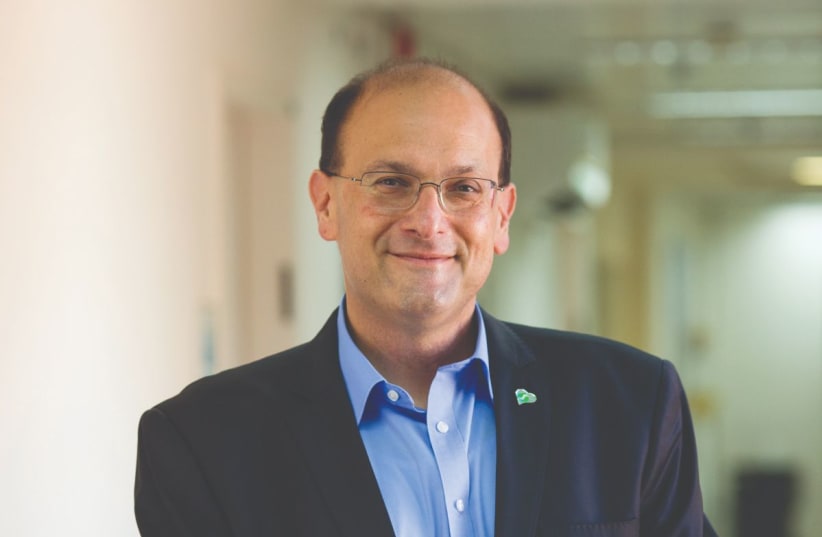"Leading a hospital under normal circumstances is challenging because of the resources that are lacking in the country’s health system,” says Dr. Shlomi Codish, director-general of Soroka University Medical Center in Beersheva. “Nowadays, during corona, it requires one’s attention 24/7, not just in treating patients, but in keeping with the hospital staff and their well-being, in order to provide the best treatment for the citizens of the Negev.”
Dr. Codish, a graduate of Ben-Gurion University’s Faculty of Health Sciences, was appointed director-general in 2018. He holds a master’s degree in public health from BGU and is a specialist in internal medicine.
Soroka University Medical Center, explains Dr. Codish, is unique among Israeli hospitals. It is the second-largest hospital in Israel and the only one in the Negev, which covers 60% of Israel’s landmass. With its 1,170 beds, Soroka provides medical services to over one million residents of the Negev. In addition, he notes, the hospital has unusual strategic importance due to its proximity to Gaza. “We are the only medical center that can provide a comprehensive response in any security event involving Gaza,” says Dr. Codish.
In this respect, Soroka was uniquely positioned to handle the pandemic. “We have many emergency protocols and a culture that can adapt to emergency situations,” says Dr. Codish. “We can get up to speed quickly in these circumstances.” Dr. Codish explains that Soroka treated the pandemic emergency in the same way that it has been trained to handle all unusual events, opening a command center, and using its emergency protocols that were already in place.
Since the beginning of the pandemic, Dr. Codish notes, Soroka has managed to have most mildly ill corona patients treated through the community clinics, primarily with Clalit health care clinics, instead of hospitalizing them. Patients seriously ill with corona have been treated in the hospital itself.
Critically ill corona patients at Soroka are treated in a separate intensive care unit (ICU) dedicated to corona patients, rather than being placed in internal medicine wards, says Dr. Codish. “They receive the same treatment as anyone who needs to be in the ICU. We want everyone to have the best chance of survival.”
Dr. Codish says that it is crucial to support hospital staff during the pandemic. “This week,” says Dr. Codish, “we opened a new corona ward maintained by nurses from the department of surgery.” He explains that this is a team effort, and every division in the hospital is stepping up, taking part in this national mission. In addition, he notes, “If we get to an extreme situation, everyone in the hospital will need to treat corona patients.”
As head of Soroka, Dr. Codish recognizes that he has a visible and public form of responsibility. “What we say publicly has significance, and we need to speak responsibly. We need to encourage people and set a personal example. In a period where public trust in and compliance with governmental instructions is critical, our words and actions have meaning. Our personal choices about attending mass events, for example, weddings or soccer matches, need to reflect this.”
Dr. Codish says that it is impossible to predict the effects of the coronavirus in Israel and the world in the coming year. Nevertheless, he says it is clear that the Israeli health system must change. “The current situation is not healthy, even in normal times. We are in a situation where the health system has an annual shortfall of between NIS 3 and 5 billion.” The current circumstances put constant pressure on medical teams.
In his view, the country must vastly increase the amount of medical personnel in the system and plan for the next 15 years. “Where will the next generation of doctors and nurses come from? Who will replace those who came from the Former Soviet Union in the 1990s? These issues were true before corona and are even more pressing now.”
Looking beyond corona, Dr. Codish emphasizes the importance of innovation and the unique role that Soroka can play. “One of the most important elements of medicine today,” says Dr. Codish, is “research and innovation.” Soroka University Medical Center is uniquely qualified in this area, he explains. Ben Gurion University, a major research institution, is nearby. A hi-tech park is just 800 meters away from the hospital, and the first innovation district in Israel, located in Beersheva, with Soroka being a key partner of its establishment, encourages innovation and development. “Research and innovation are a strategic area for the hospital, and we have to progress as quickly as possible. The hi-tech world is going towards medicine, digital health, and biopharma. We want to be at the forefront of these developments. This can be a game-changer, not just for us, but for the entire country, the health system, and for the world.”
Ultimately, says Dr. Codish, the most essential component of Soroka is its staff. “Having the responsibility of maintaining the health of one million Israeli residents in over 60% of the country’s landmass is a tremendous responsibility. We have 5,000 people on our staff, and each morning when they get up, they ask themselves, ‘How can we help the residents of the Negev today.’ This is our greatest asset, and my greatest responsibility is to preserve this spirit.”
This article was written in cooperation with Soroka
